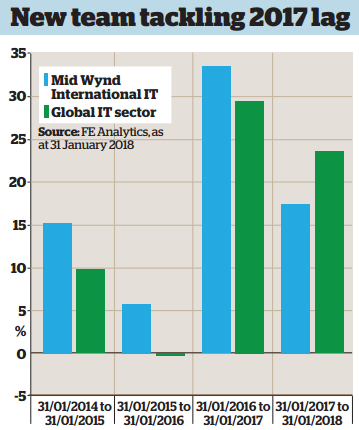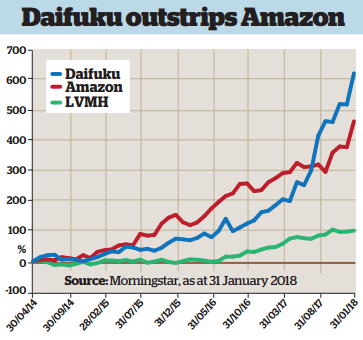Buy, hold, sell: Betting on bots and brands
26th February 2018 10:35
Between May 2014 and the end of January 2018, 's share price nearly doubled, rising by about 96%. This surge came in the wake of a management overhaul at the investment trust, when Mid Wynd's board appointed three new co-managers: Artemis Fund Managers' Simon Edelsten, Rosanna Burcheri and Alex Illingworth.
For the new team, the key measure is cash earnings. The question they ask about each potential holding is: how much is the cash flow each year and how does that compare with the share price?
As its name suggests, the trust invests in equities worldwide and is housed in the global investment trust sector. Its largest holding is in US equities (44.3%), followed by Japanese (12.4%) and Chinese (8.2%).
Its spread across industry sectors is also diverse, with software, real estate and healthcare/medical products leading the line-up. It aims to have holdings that are not all tied to the same aspect of the global economy or to any single region. There are "known unknowns" to protect against, says Edelsten, but "we also want to ensure the portfolio can cope with unknown unknowns".
The trust is index-agnostic. Investment management is about making clients wealthier over time, he stresses, not about trying to beat a shifting index. And that involves guarding against inevitable downturns. "Our fund is well balanced," he says. This means that in the event of a market downturn, it will "go down more slowly".

Buy: Daifuku
Mid Wynd started "keeping an eye on automation and robotics stocks when China found automation cheaper than adding labour," according to Edelsten. China's automation push in its production processes will, he says, be "a key trigger for rising demand". For China, automation is a way "of getting the quality of products up" - a key aim of the Chinese government's plans for economic development. As a result, there has been a flurry of state funding for automation in China. This rise in demand has been enjoyed, in particular, by some Japanese automation companies, whose order books have started rising very rapidly.
All this led Edelsten to buy Japan-based , a leader in automation and robotics, in July 2017, at ¥3,330 a share. The firm has seen sales growth of around 100% over the past year. "Earnings are expected to grow from ¥136 a share last year to ¥211 this year. At the end of January 2018, the share price was ¥7,440 yen, an increase of 123% since purchase."

Hold: LVMH Moet Hennessy Louis Vuitton
"With this company," says Edelsten, "earnings are not a bad guide to what's going on." Since 2014, when he inherited it, earnings have grown from €7.40 a share to €10.40 in 2017. Turnover is expected to be €45 billion for this year.
A major tailwind for has been emerging markets. Its Moët Hennessey cognac is popular in China. For such high-end luxury goods, he says, "sales growth is rock-solid". If global growth ticks upward as expected in 2018, Louis Vuitton looks set for further strong sales. Edelsten stresses the quality of management at the company. "It is very well run," he says.
When the managers took over the fund on 1 May 2014, the share price was €128. At the end of January it was €251, a 96.8% increase.
Sell: Amazon (NASDAQ: AMZN)
Mid Wynd's sell is perhaps its most contrarian play. can do no wrong in the eyes of many investors, but Mid Wynd's managers sold their holdings in 2017. Edelsten says that in May 2014 they were still enthusiastic holders of Amazon - priced at the time at $304 (£219) a share. But Edelsten fears that valuations have got out of hand. "Cash flow growth has not kept up with share price growth," he says.
Meanwhile, Amazon's expansion into groceries makes Edelsten uneasy. "This is one of the most difficult sectors in retail. You have got the lowest margins and short shelf life. That's a long way from where Amazon started: popping high-margin CDs through letterboxes," he says. He adds: "Mid Wynd is a cautious trust. When a share has moved beyond a valuation range we feel comfortable with, we sell and move on."
The Amazon holding was sold on 19 June 2017 at $995 a share, an increase of 227% on the purchase price.
This article was originally published in our sister magazine Money Observer, which ceased publication in August 2020.
These articles are provided for information purposes only. Occasionally, an opinion about whether to buy or sell a specific investment may be provided by third parties. The content is not intended to be a personal recommendation to buy or sell any financial instrument or product, or to adopt any investment strategy as it is not provided based on an assessment of your investing knowledge and experience, your financial situation or your investment objectives. The value of your investments, and the income derived from them, may go down as well as up. You may not get back all the money that you invest. The investments referred to in this article may not be suitable for all investors, and if in doubt, an investor should seek advice from a qualified investment adviser.
Full performance can be found on the company or index summary page on the interactive investor website. Simply click on the company's or index name highlighted in the article.
These articles are provided for information purposes only. Occasionally, an opinion about whether to buy or sell a specific investment may be provided by third parties. The content is not intended to be a personal recommendation to buy or sell any financial instrument or product, or to adopt any investment strategy as it is not provided based on an assessment of your investing knowledge and experience, your financial situation or your investment objectives. The value of your investments, and the income derived from them, may go down as well as up. You may not get back all the money that you invest. The investments referred to in this article may not be suitable for all investors, and if in doubt, an investor should seek advice from a qualified investment adviser.
Full performance can be found on the company or index summary page on the interactive investor website. Simply click on the company's or index name highlighted in the article.
Editor's Picks